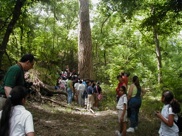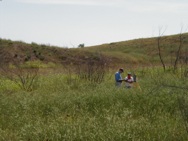LHI Historical & Organizational Timeline
Pre-Columbian Land occupied by indigenous people
Post-Columbian Land eventually claimed by Spanish after competing somewhat with the French
1808 Via Spanish Land Grant, Juan Ignacio Perez owned the land
1821 Mexico won independence from Spain
1836 Texas won independence from Mexico
1850s Land purchased from John R. Cunningham (via the State of Texas et al.) by Presnall family for cotton plantation
1880s Land purchased by Watson family who farmed and ranched on the land for over 100 years
1979 City resolution authorizes City Water Board to proceed with plans for reservoir construction.
1982 Application made for Army Corps of Engineers 404 Permit to impound Applewhite Reservoir issued in 1989.
1989-91 Land Purchases made for the CWB Applewhite Reservoir on Medina River, planned for supplemental drinking water for City of San Antonio.
1991 1st city referendum election held after petition drive, narrowly fails, construction halts.
1992 City Water Board changes to San Antonio Water System and Applewhite Plan revised, construction on revised plan begins.
1992 2nd citywide referendum election after another petition drive, citizens again vote down construction of the reservoir. City council stops work and orders SAWS to drop state and federal COE 404 impoundment permit and dispose of properties within legally binding COE programmatic stipulations (Ordinance 80632, SAWS Resolution 94-187).
1994-96 Legal issues and potential site owners investigated, stakeholders identified.
1996 Friends of Medina River (FoMR) formed with Bonnie Conner as President.
1997 SAWS enters into memorandum of understanding with FoMR and the American Institute of Architects and South San Antonio Chamber of Commerce to hold a planning charrette for Medina River Properties. 80 participants attend day long planning workshop co – sponsored by FoMR, AIA, SAWS and South San Antonio Chamber.
1997 SAWS board endorses the Medina River Charrette ideas. This includes conservation easements, Land Heritage Institute concept. (August 12, 1997)
1999 SAWS board provides Texas A&M $100,000 grant to study Land Heritage Institute concept, develop partnerships, seek state funding. TAMU has five years to develop idea on 1,640 acres of property acquired by SAWS for the defunct Applewhite Reservoir.
2000 Texas A&M delivers planning document for Land Heritage Instituteof the Americas is delivered to SAWS. (December 2000)
2001 South San Antonio Chamber holds LHI partnership workshop in Fall of 2001. Congressman Ciro Rodriquez sponsors second federal Camino Reales bill in Congress.
2002 The Land Heritage Institute Foundation is incorporated and granted Federal tax exempt status. Twenty four organizations participate in the cooperative effort to secure ownership of the property.
2003 Toyota Motor Manufacturing announces it will locate a truck manufacturing plant on 2,700 acres adjacent and north of the LHI site.
2004 SAWS transfers the LHI site to the City of San Antonio.
2005-2007 Land Heritage Institute (LHI) completes Deed Restriction negotiations between the City of San Antonio and the Starbright Corporation representing Toyota that establishes use of property and mission of LHI.
2008 City of San Antonio grants ownership of the property to the Land Heritage Institute Foundation and LHI assumes maintenance, liability and begins programming on site to fulfill mission. Cattlemens Texas Longhorn Registry (CTLR) Longhorns are located on site for interpretive programming. American Indians in Texas at the Spanish Colonial Missions reach agreement with Karam family to re-locate Mayan/Toltec/Aztec statuary to LHI for future exhibit. Presnall Watson Homestead declared “Historic Property” by city of San Antonio.
2009 Existing Dairy Barn rehabilitated into new LHI Headquarters building (HQ). An LHI/FOTOSEPTIEMBRE USA collaboration results in Ansen Seale’s on-site installation, The Corn Crib; its opening coincides with a Texas Public Radio “Land Heritage Day” at LHI. The 2009 LHI Art-Sci Symposium, “The Nature of Place: Land Art/Land Use” is held at the Toyota Visitors Center. FOTOSEPTIEMBRE USA collaboration, Diverse Cultures/One Land.
2010 “The Trail” 10k Fun Run and Heritage Day fundraiser held on property utilizing newly opened Medina River Greenway Trail (Chaparral Trail). Permanent Director Organizations hold field days on property. TETRA Fun day held on site for disadvantaged youth. Property opens to public every 2nd Saturday of the month.
2011 “Los Caminos Naturales” Trail System begins construction utilizing Americorps volunteers. When completed, Los Caminos will add 20 miles of hike/bike/equestrian trails to property. 2nd Annual Native San Antonio Celebration held. Native SA, a celebration of all things native, draws 500 visitors to property. 2nd Art Sci Symposium “Land as Lab” held on site. First three trails of LCN opened.
2012 The “Bunkhouse” complete at LHI Equestrian/HQ site utilized for Americorps volunteers who stay on site while they construct hike/bike/equestrian trails. 3rd Annual Native San Antonio spring celebration held on site for 600 visitors. Roots Music Festival held showcasing roots of honky tonk south Texas bands. First “Heritage Day Camp” for kids held for local and disadvantaged youth. Presnall Watson Homestead Historic District established by National Register of Historic Places.
2013 Third LHI Art-Sci Symposium: “Why Art-Sci?” Creative think-tank with national museum “visionaries” brainstorm Historic District's future.
2014 “Pon la Mesa” by artist Jose Chapa is an on-site installation and curriculum investigating local proclivities toward diabetes and obesity.
2015 Presnall-Watson Homestead Historic District design charette. National Endowment for the Arts and National Trust for Historic Preservation grants support designs for Historic District. Fourth LHI Art-Sci Symposium. “One Land-Many Hands” Second Saturday series.




